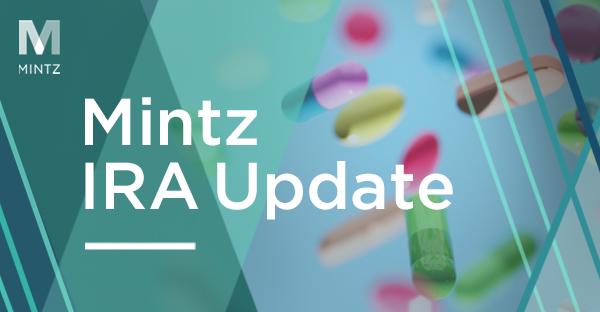
Health Care Enforcement & Investigations
Viewpoints
Filter by:
DOJ: ‘False Claims Act + Cybersecurity’ Is Here To Stay
April 3, 2025 | Blog | By Scott Lashway, Karen Lovitch, Matthew Stein
Amid ongoing policy shifts in Washington, the federal government’s interest in pursuing civil cyber-fraud cases appears to be here to stay.
First Circuit Adopts “But-For” Causation Standard for False Claims Act Cases Based on Anti-Kickback Statute Violations
February 20, 2025 | Blog | By Grady Campion, Melody Mathewson
In United States v. Regeneron Pharmaceuticals, Inc., the First Circuit joined the emerging majority view that False Claims Act (FCA) claims based on violations of the Anti-Kickback Statute (AKS) require a showing of “but-for” causation. As we previously reported, the Sixth Circuit and the Eighth Circuit have also held that the stricter “but-for” causation standard applies to AKS-based FCA claims.
Mintz IRA Update — A Circuit Win and the End of Chevron Deference Could Shift Tides in Drug Price Negotiation Program Challenges
February 13, 2025 | Article | By Xavier Hardy, Mitchell Clough
Read about how a win in the Fifth Circuit and the end of Chevron deference could breathe new life into the Medicare Drug Price Negotiation Program challenges despite continued losses in federal court.
EnforceMintz — Health Care False Claims Act Statistical Year in Review
February 3, 2025 | Blog
Mintz’s annual report on False Claims Act case activity analyzes data from DOJ and the firm’s Health Care Qui Tam Database, and explores the 2024 record high in FCA case activity, the moderate increase in health care–related activity.
Health Care Enforcement Trends & 2025 Outlook
January 17, 2025 | Blog | By Karen Lovitch, Samantha Kingsbury, Keshav Ahuja, Eoin Beirne, Grady Campion, Daniel Cody, Tara E. Dwyer, Laurence Freedman, Hope Foster, Jane Haviland, Nicole Henry, Caitie Hill, Robert Kidwell, Nick A. LaPalme, Scott Lashway, Kevin McGinty, Payton Thornton, Matthew Stein, Rachel Yount
Our 2025 edition of EnforceMintz reflects on health care enforcement trends, predicts how health care enforcement may evolve, and offers practical guidance about what these trends and predictions mean for health care providers, payors, and other stakeholders.
EnforceMintz – DOJ Policy Developments in 2024 Seek to Motivate More Voluntary Self-Disclosures
January 16, 2025 | Blog | By Eoin Beirne, Nick A. LaPalme, Karen Lovitch
Over the past two years, the Department of Justice has actively incentivized companies to voluntarily self-disclose potential civil and criminal violations. This article explores the DOJ’s new policies, the benefits of self-disclosure, and the challenges companies face in complying with these initiatives.
EnforceMintz — Scienter, Causation, and Constitutional Questions: 2024’s Three Key FCA Litigation Issues
January 16, 2025 | Blog | By Keshav Ahuja, Grady Campion, Laurence Freedman, Kevin McGinty
In 2024, federal courts issued significant False Claims Act decisions for the health care and life sciences industries. These decisions further develop the FCA scienter standard addressed by the Supreme Court in its 2023 SuperValu decision and reexamine the constitutionality of the FCA’s qui tam provisions. A circuit split on the interpretation of “causation” for FCA suits based on alleged violations of the Anti-Kickback Statute (AKS) has also emerged.
EnforceMintz — Telemedicine Enforcement: Trends in 2024 Suggest More Sophisticated Enforcement to Come in 2025
January 16, 2025 | Blog | By Daniel Cody
In 2024, DOJ and the OIG expanded telehealth enforcement beyond traditional telefraud schemes, addressing compliance with state corporate practice and telehealth-specific billing codes. Two cases, including the first criminal telemedicine prosecution, signal a trend of heightened regulatory scrutiny for the maturing telehealth industry.
EnforceMintz —Could the Supreme Court’s Decision in Jarkesy Mean the End to HHS Civil Monetary Penalty Authorities as We Know Them?
January 16, 2025 | Blog | By Samantha Kingsbury
Following the Supreme Court’s decision in Securities and Exchange Commission v. Jarkesy, holding that the Seventh Amendment entitles defendants to a jury trial when the SEC seeks to impose civil monetary penalties for a securities fraud violation, parties are starting to assert Jarkesy-based arguments in appealing administrative actions of the Department of Health and Human Services.
EnforceMintz — Novel Criminal Charges and Emerging Civil Trends from Opioid Enforcement in 2024
January 16, 2025 | Blog | By Eoin Beirne, Grady Campion
As opioid-related enforcement efforts continued across the opioid supply chain in 2024, the government pursued criminal charges in two matters that resulted in significant settlements. Additionally, a number of recent cases against pharmacies involve a common theory of liability based on the Controlled Substances Act, which served as the basis for civil liability under the False Claims Act.
EnforceMintz — 2024’s Key False Claims Act Settlements Involving Hospitals and Health Systems: Continued Focus on Stark Law and Anti-Kickback Statute Violations
January 16, 2025 | Blog | By Daniel Cody, Laurence Freedman, Rachel Yount
In 2024, DOJ resolved several noteworthy False Claims Act cases against hospitals and health systems, obtaining numerous large recoveries in cases where Stark Law and federal Anti-Kickback Statute violations served as a predicate for FCA claims.
EnforceMintz — Healing Healthcare? DOJ’s Cybersecurity Enforcement Trained Up for 2025
January 16, 2025 | Blog | By Laurence Freedman, Scott Lashway, Matthew Stein
In 2024, the Department of Justice ramped up cybersecurity enforcement under the Civil Cyber-Fraud Initiative (CCFI), targeting entities that failed to safeguard PHI and PII in federally funded contracts. Key cases highlight trends in False Claims Act litigation and underscore the importance of cybersecurity compliance heading into 2025.
EnforceMintz — Medicare Advantage and Part D Programs to Remain in the Enforcement Spotlight in 2025
January 16, 2025 | Blog | By Tara E. Dwyer, Nicole Henry, Caitie Hill
In 2024, the Department of Justices and Centers for Medicare & Medicaid Services intensified enforcement in Medicare Advantage and Part D, with a focus on risk adjustment audits and Star Ratings disputes. Key developments, including litigation and regulatory changes, signal heightened scrutiny for MAOs, PDP Sponsors, and their vendors in 2025.
EnforceMintz — FCA Enforcement in Value-Based Care Arrangements Heated Up in 2024 and Likely to Remain a Priority in 2025
January 16, 2025 | Blog | By Grady Campion, Karen Lovitch
Government scrutiny of value-based care (VBC) health care delivery models is expected to increase as VBC adoption grows. In 2024, the DOJ announced a large FCA settlement with a VBC primary care practice, and HHS’s Office of Inspector General issued a Special Fraud Alert focusing on VBC business arrangements.
EnforceMintz — Additional Health Care Provider Joins the OIG’s “Heightened Scrutiny” List in 2024
January 16, 2025 | Blog | By Hope Foster
In 2024, the HHS Office of Inspector General added the University of Colorado Health d/b/a/ UCHealth, an established provider, to the Heightened Scrutiny list after UCHealth settled an FCA case for $23 million, without an admission of wrongdoing.
EnforceMintz — Don’t Forget Your Other Regulators: Consumer Protection Enforcement in Health Care Markets
January 16, 2025 | Blog | By Robert Kidwell, Samantha Kingsbury, Payton Thornton
In 2024, the FTC and state attorneys general pursued various theories of liability against a diverse array of entities offering health care or health care–related services, and employed numerous different enforcement tools and partnerships. We expect that the agencies will continue developing these strategies in 2025.
EnforceMintz — Long Tail of Pandemic Fraud Schemes Will Likely Result in Continued Enforcement for Years to Come
January 16, 2025 | Blog | By Jane Haviland
In 2024, the COVID-19 Fraud Enforcement Task Force, in conjunction with five COVID Fraud Enforcement Strike Forces and other government agencies, has resolved many significant criminal and civil pandemic fraud cases. More civil pandemic fraud enforcement actions and continuing criminal actions are expected in 2025.
EnforceMintz — Health Care Enforcement Trends & 2025 Outlook
January 16, 2025 | Blog
Our 2025 edition of EnforceMintz reflects on health care enforcement trends, predicts how health care enforcement may evolve, and offers practical guidance about what these trends and predictions mean for health care providers, payors, and other stakeholders.
DOJ Reinforces Emphasis on Voluntary Self-Disclosure With Latest Updates to the Evaluation of Corporate Compliance Programs Guidance
October 7, 2024 | | By Eoin Beirne, Nick A. LaPalme, Karen Lovitch
On September 23, 2024, the Criminal Division of the United States Department of Justice (“DOJ” or the “Department”) revised its Evaluation of Corporate Compliance Programs guidance (the “ECCP”). This article focuses on significant revisions detailed in the most recent installment of the guidance.
Federal District Court Holds FCA’s Private Whistleblower Provisions Unconstitutional
October 4, 2024 | Blog | By Grady Campion, Jane Haviland, Karen Lovitch
On September 30, 2024, a federal district court judge held that the qui tam provisions of the False Claims Act (FCA) violate the Appointments Clause of Article II of the Constitution. U.S. ex rel. Zafirov v. Fla. Med. Assocs., LLC, C.A. No. 8:19-cv-01236-KKM, 2024 U.S. Dist. LEXIS 176626 (M.D. Fla. Sept. 30, 2024) (“Zafirov”). While Zafirov’s holding is novel, the constitutional issue raised in that decision is not.
Explore Other Viewpoints:
- Data Centers & Digital Infrastructure
- AI: The Washington Report
- Antitrust
- Appellate
- Arbitration, Mediation & Alternate Dispute Resolution
- Artificial Intelligence
- Awards
- Bankruptcy & Restructuring
- California Land Use
- Cannabis
- Class Action
- Complex Commercial Litigation
- Construction
- Consumer Product Safety
- Corporate Governance (ESG)
- Cross-Border Asset Recovery
- DEI Legal Developments
- Debt Financing
- Direct Investing (M&A)
- Diversity
- EB-5 Financing
- Education & Nonprofits
- Employment
- EnforceMintz
- Environmental (ESG)
- Environmental Enforcement Defense
- Environmental Law
- Environmental, Social, and Corporate Governance (ESG)
- FDA Regulatory
- False Claims Act
- Federal Circuit Appeals
- Financial Institution Litigation
- Government Law
- Growth Equity
- Health Care
- Health Care Compliance, Fraud and Abuse, & Regulatory Counseling
- Health Care Enforcement & Investigations
- Health Care Transactions
- Health Information Privacy & Security
- IP Due Diligence
- IPRs & Other Post Grant Proceedings
- Immigration
- Impacts of a New US Administration
- Insolvency & Creditor Rights Litigation
- Institutional Investor Class Action Recovery
- Insurance & Financial Services
- Insurance Consulting & Risk Management
- Insurance and Reinsurance Problem-Solving & Dispute Resolution
- Intellectual Property
- Investment Funds
- Israel
- Licensing & Technology Transactions
- Life Sciences
- Litigation & Investigations
- M&A Litigation
- ML Strategies
- Medicare, Medicaid and Commercial Coverage & Reimbursement
- Mergers & Acquisitions
- Patent Litigation
- Patent Prosecution & Strategic Counseling
- Pharmacy Benefits and PBM Contracting
- Portfolio Companies
- Privacy & Cybersecurity
- Private Client
- Private Equity
- Pro Bono
- Probate & Fiduciary Litigation
- Products Liability & Complex Tort
- Projects & Infrastructure
- Public Finance
- Real Estate Litigation
- Real Estate Transactions
- Real Estate, Construction & Infrastructure
- Retail & Consumer Products
- Securities & Capital Markets
- Securities Litigation
- Social (ESG)
- Special Purpose Acquisition Company (SPACs)
- Sports & Entertainment
- State Attorneys General
- Strategic IP Monetization & Licensing
- Sustainable Energy & Infrastructure
- Tax
- Technology
- Technology, Communications & Media
- Technology, Communications & Media Litigation
- Trade Secrets
- Trademark & Copyright
- Trademark Litigation
- Unified Patent Court (UPC)
- Value-Based Care
- Venture Capital & Emerging Companies
- White Collar Defense & Government Investigations
- Women's Health and Technology





